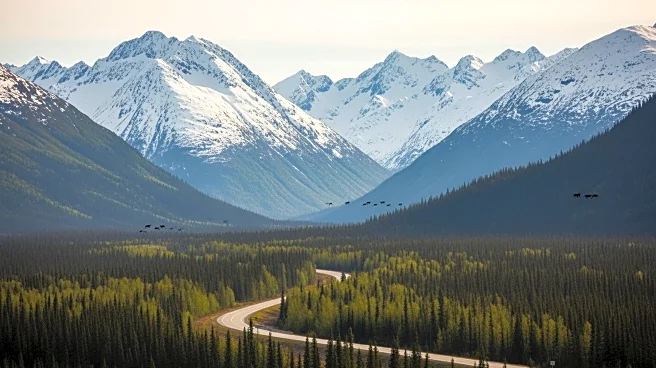What's Happening?
The Trump administration has announced its decision to proceed with a controversial land deal that will allow the construction of a road through the Izembek National Wildlife Refuge in southwest Alaska.
This decision is part of broader efforts to enhance energy development in the region, including opening the Arctic National Wildlife Refuge to oil and gas drilling. The road aims to provide better access for residents of King Cove, Alaska, who currently face challenges reaching medical facilities during emergencies. Interior Secretary Doug Burgum emphasized the decision as a balance between human health and environmental protection, involving a land exchange with the King Cove Corporation. However, environmentalists and Indigenous groups have raised concerns about the potential impact on the pristine ecosystem, which is home to migratory birds, caribou, and brown bears.
Why It's Important?
The decision to construct a road through the Izembek National Wildlife Refuge has significant implications for both local communities and environmental conservation efforts. For residents of King Cove, the road promises improved access to medical care, potentially saving lives during emergencies. However, environmentalists warn that the road could disrupt the delicate ecosystem, introducing pollution and human activity that may harm wildlife populations. The move also reflects broader policy shifts towards energy development in Alaska, with potential economic benefits from oil and gas exploration. Yet, it raises questions about the balance between development and conservation, highlighting ongoing debates over land use and environmental protection.
What's Next?
The construction of the road through the Izembek National Wildlife Refuge is likely to face continued opposition from environmental groups and Indigenous communities concerned about its impact on the ecosystem. Legal challenges and public protests may arise as stakeholders seek to protect the refuge's biodiversity. Additionally, the opening of the Arctic National Wildlife Refuge to oil and gas drilling could lead to further environmental scrutiny and regulatory hurdles. As the Trump administration moves forward with these initiatives, the debate over land use and conservation in Alaska is expected to intensify, with potential implications for future policy decisions.
Beyond the Headlines
The decision to build a road through the Izembek National Wildlife Refuge highlights broader ethical and cultural considerations regarding land use and Indigenous rights. The land exchange with the King Cove Corporation reflects ongoing tensions between development interests and the preservation of Indigenous heritage and environmental integrity. The move also underscores the challenges of balancing economic growth with sustainable practices, as policymakers navigate complex trade-offs between human needs and ecological preservation. Long-term, the decision may influence future land management strategies and conservation policies in Alaska and beyond.









